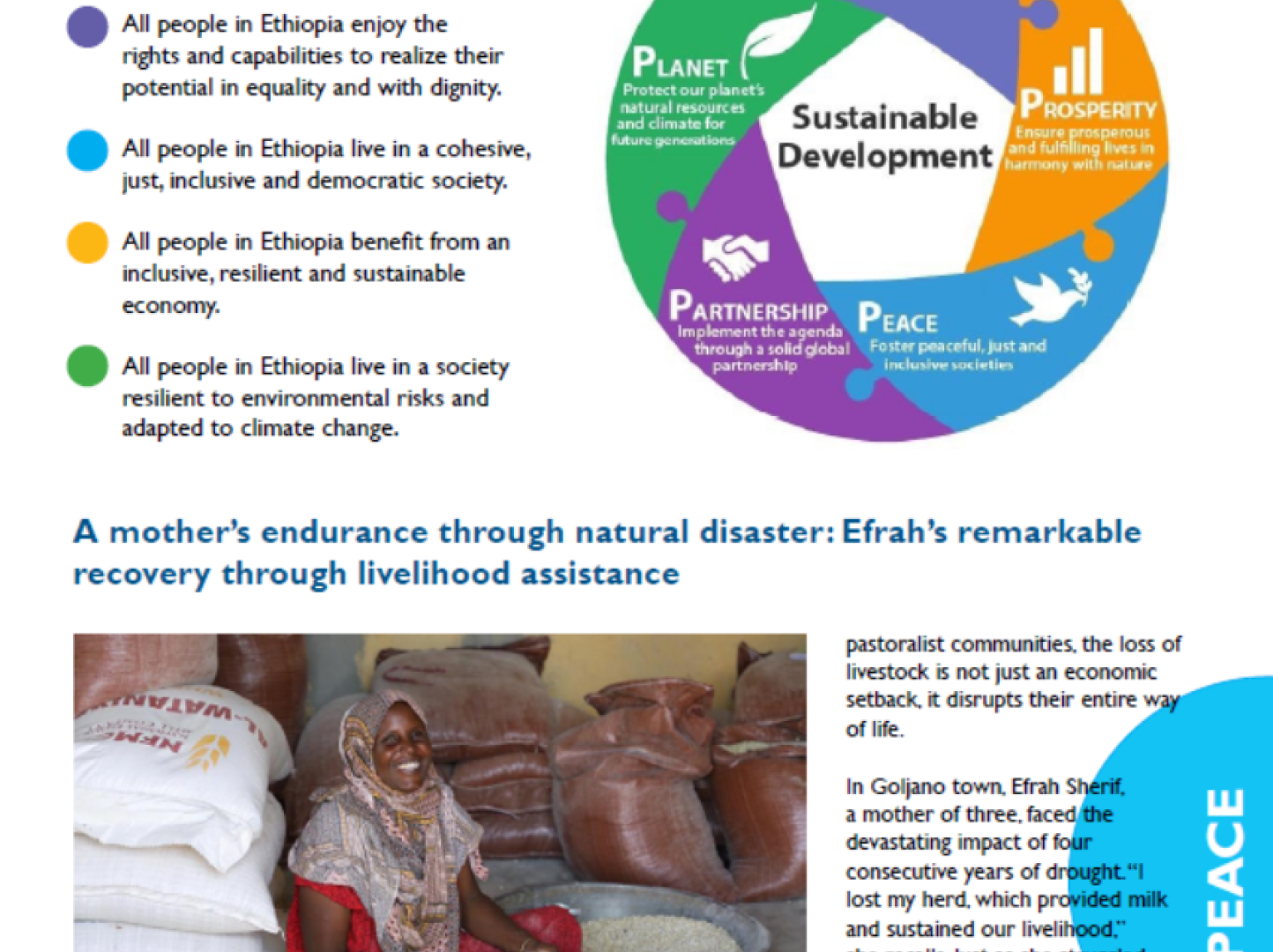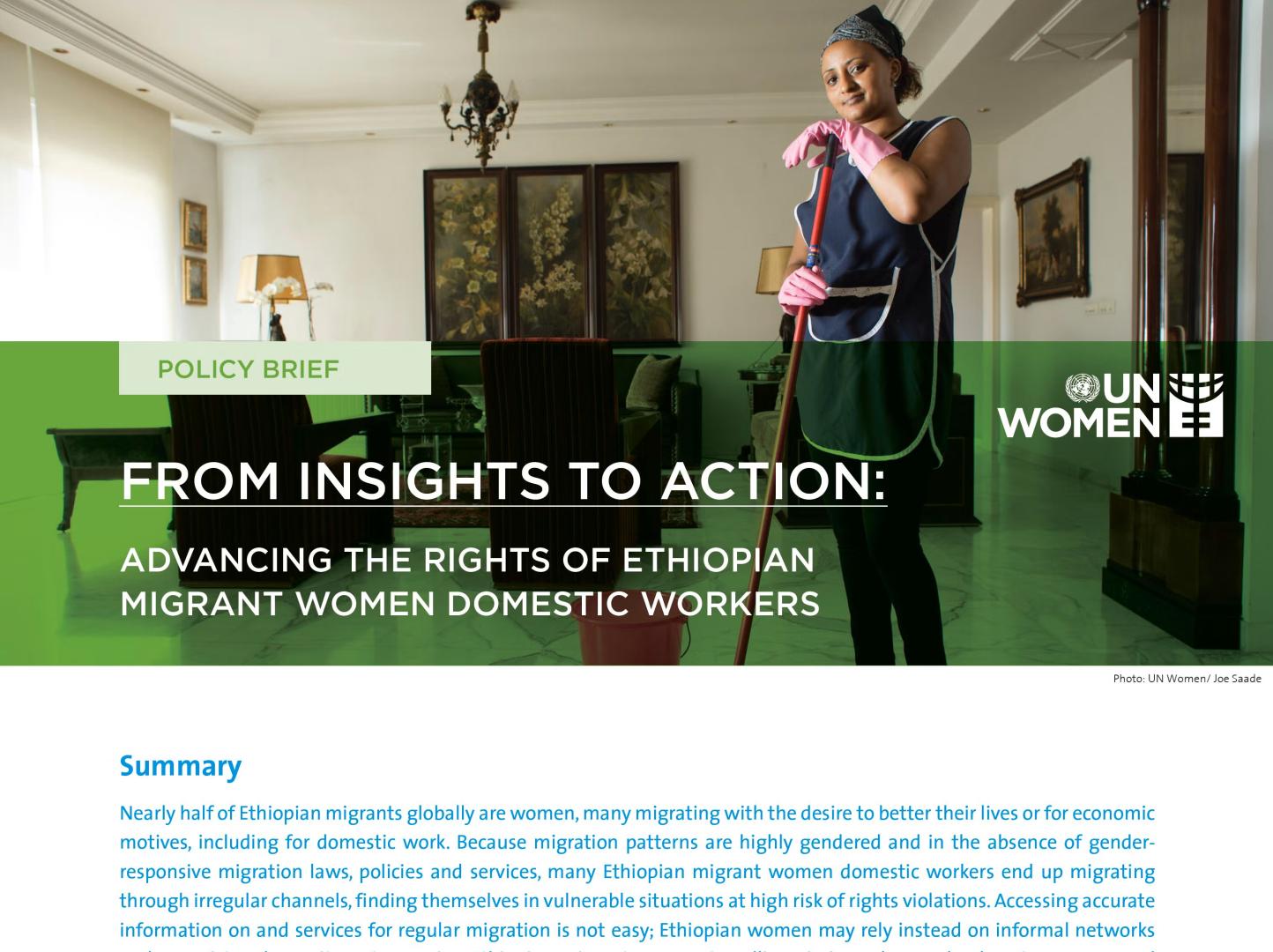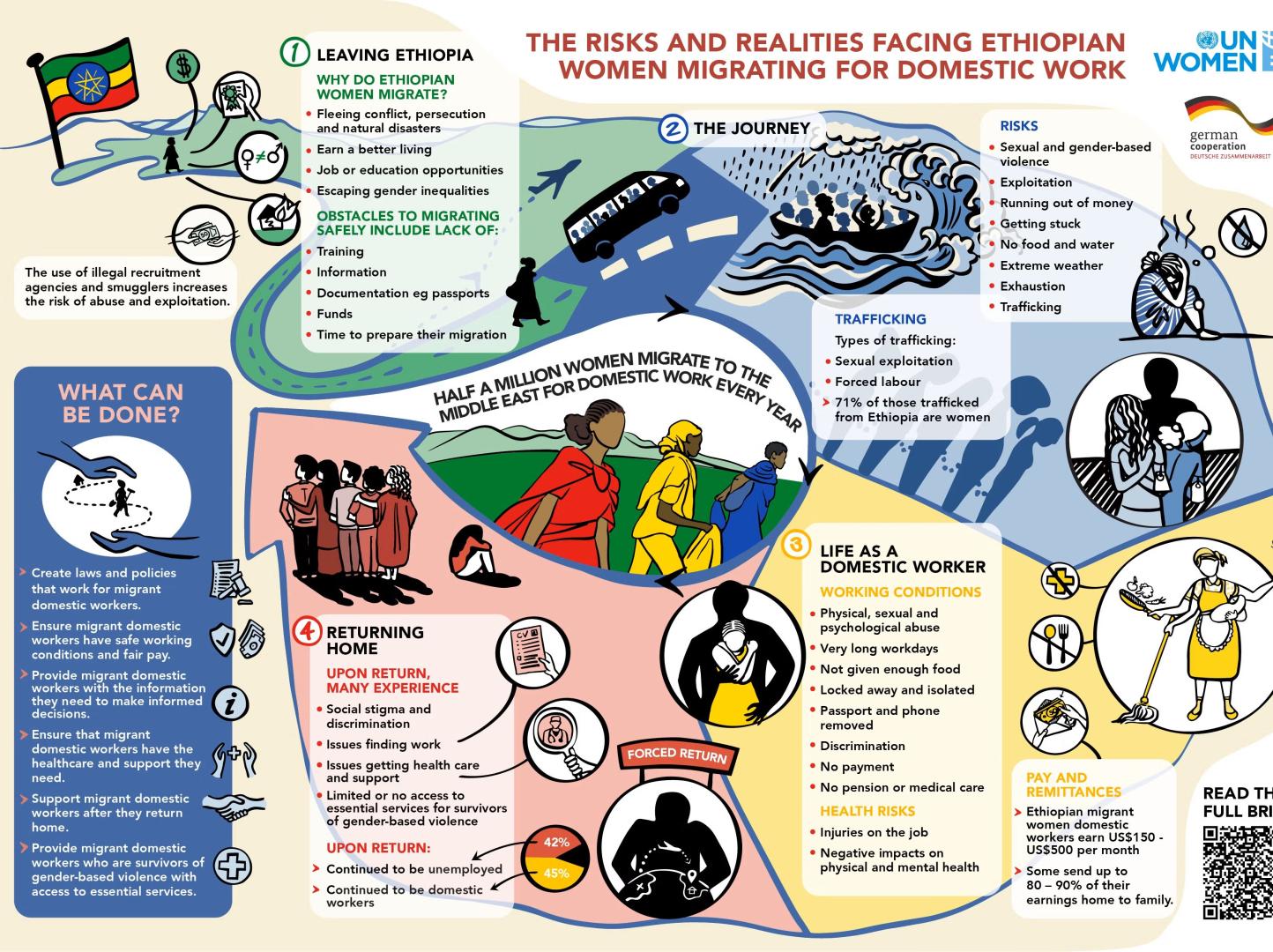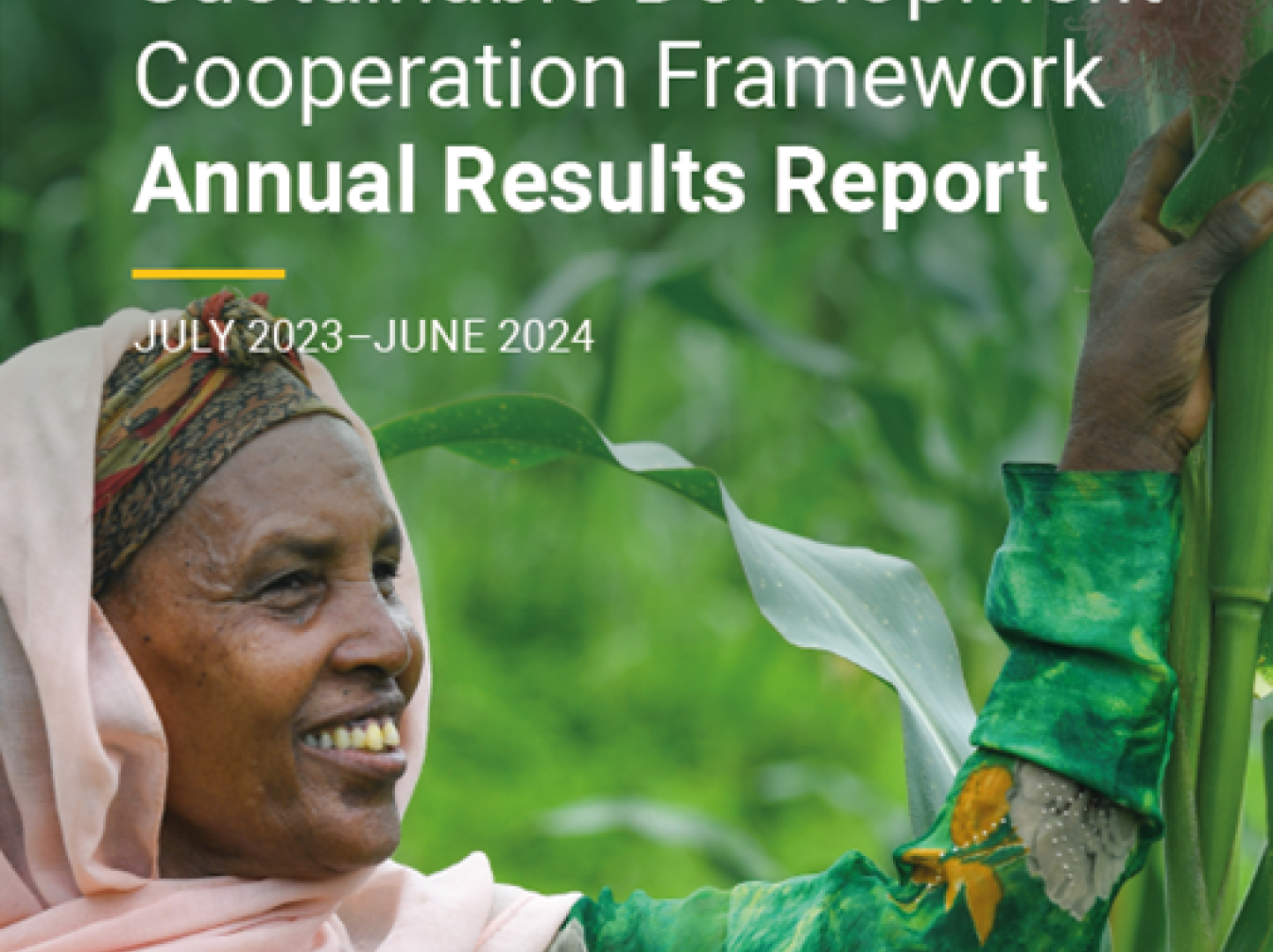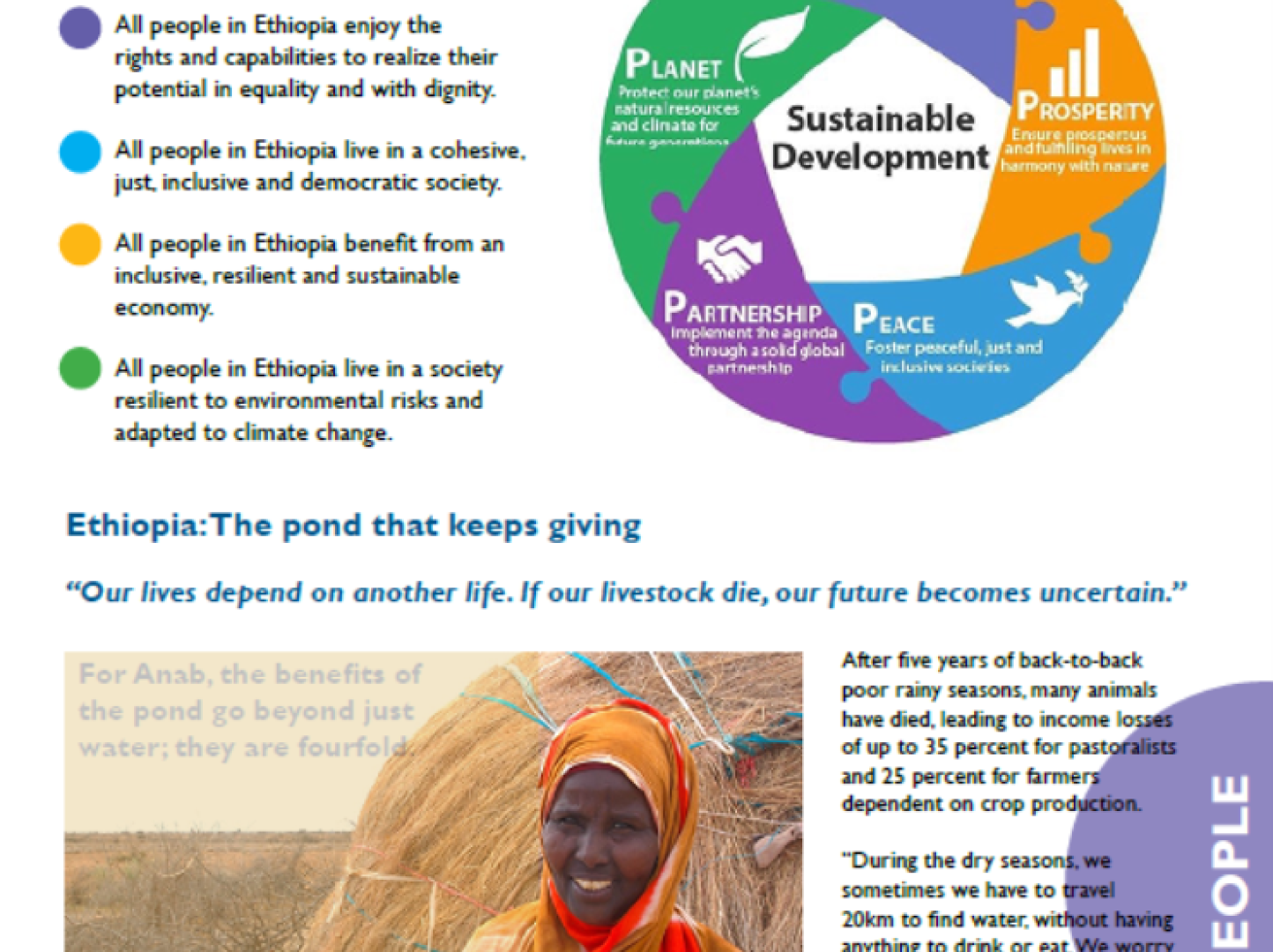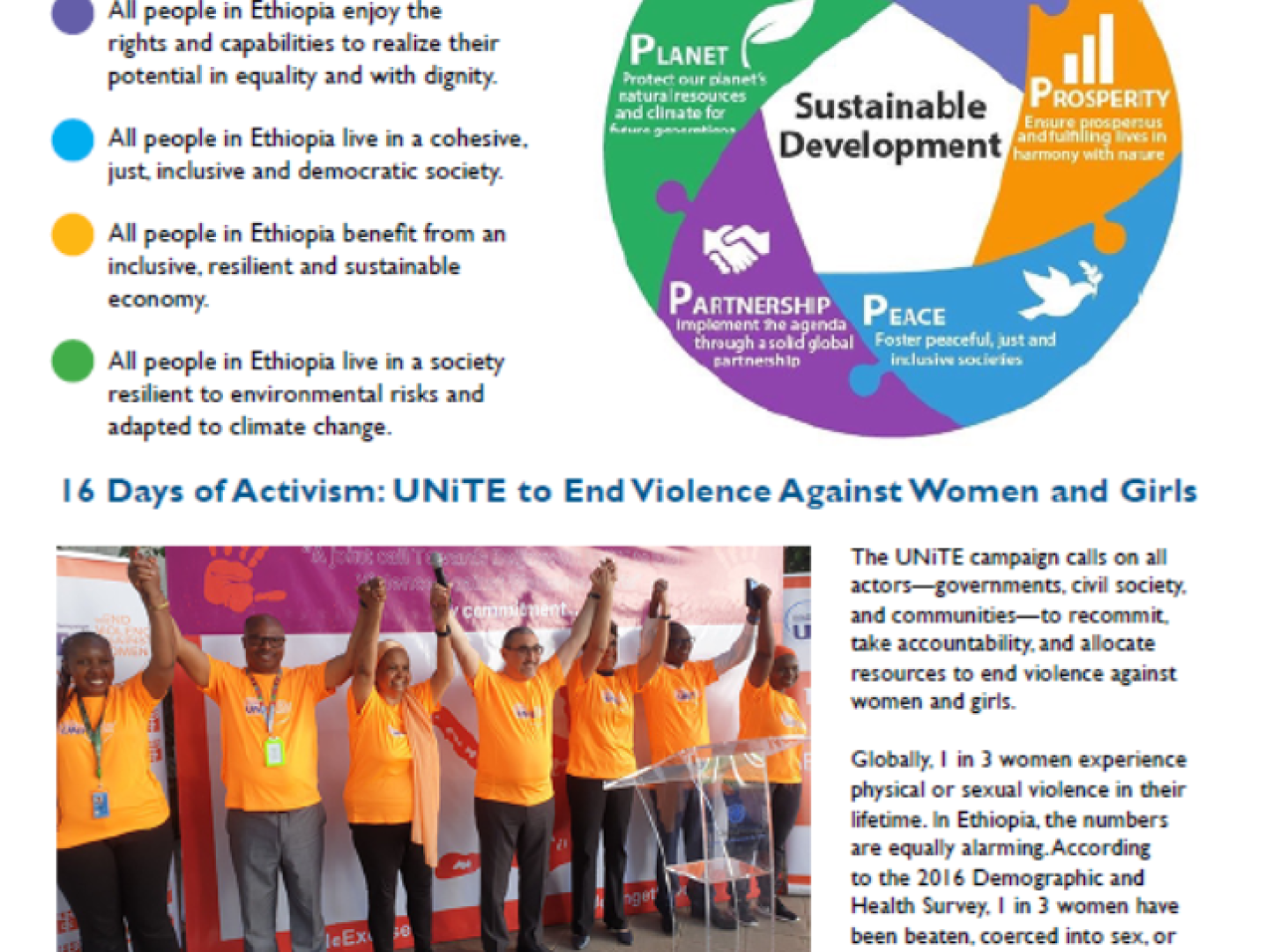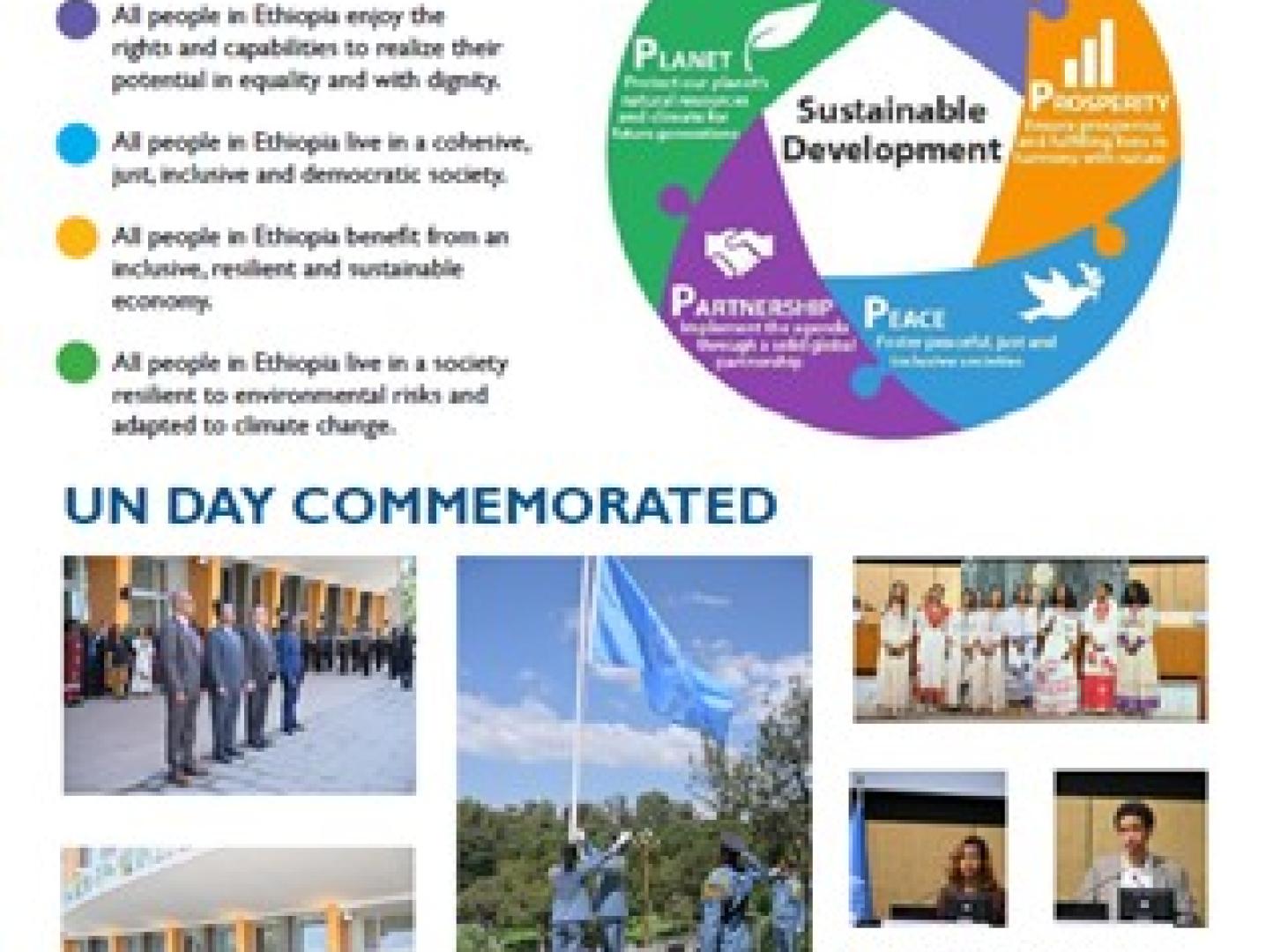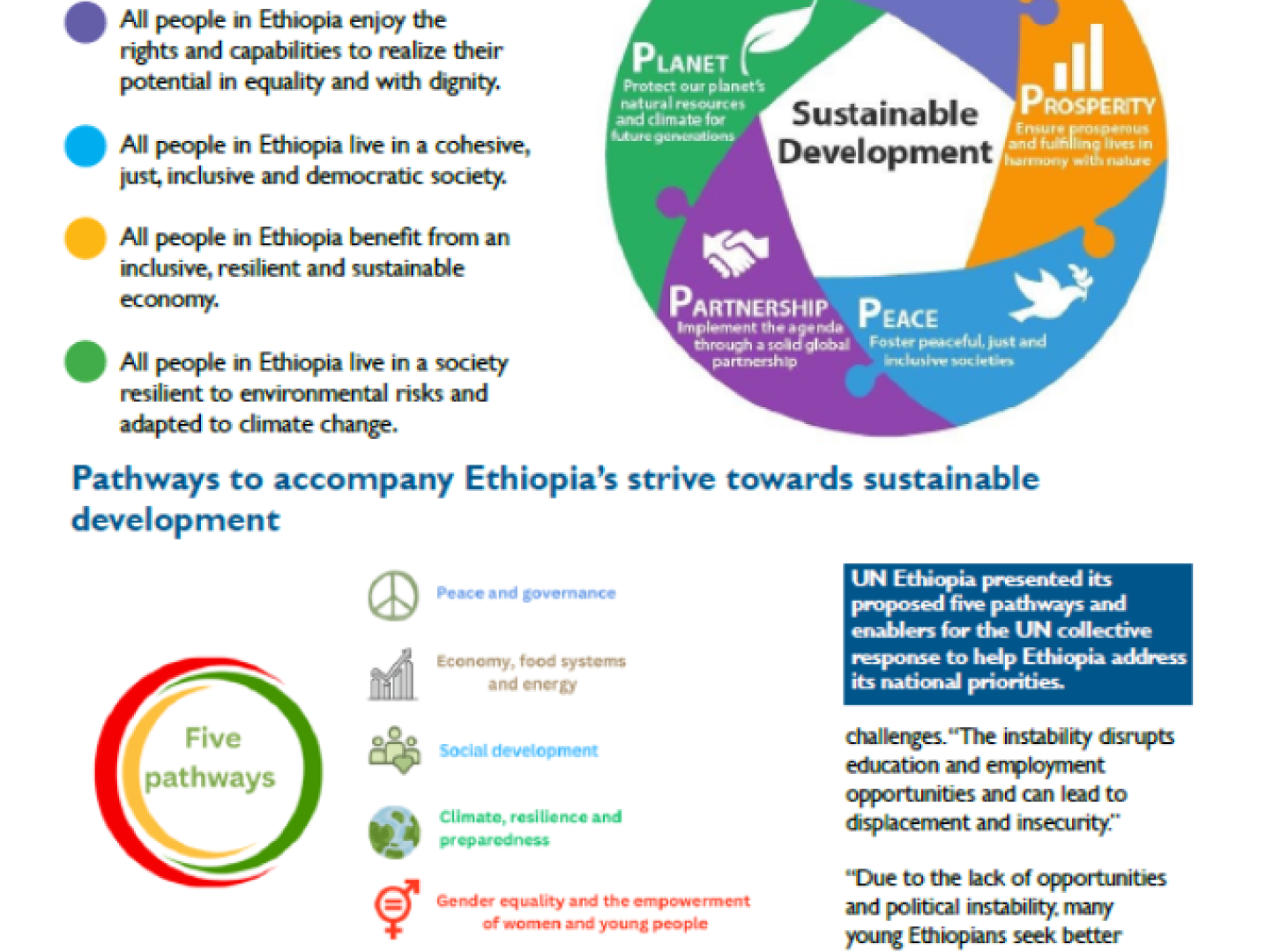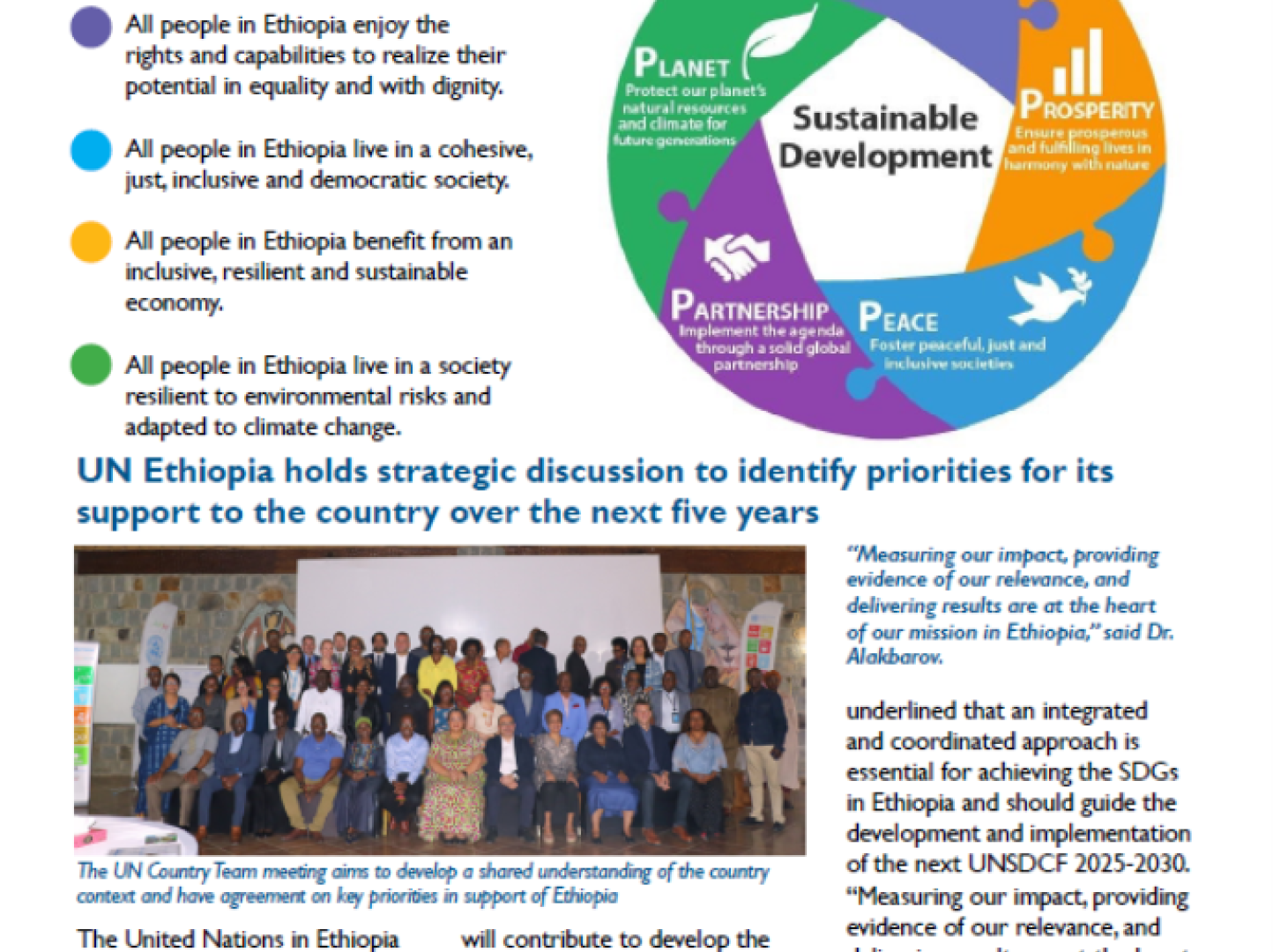Latest
The Sustainable Development Goals in Ethiopia
The Sustainable Development Goals are a call for action by all countries – poor, rich and middle-income – to promote prosperity while protecting the planet. They recognize that ending poverty must go hand-in-hand with strategies that build economic growth and address a range of social needs including education, health, social protection, and job opportunities, while tackling climate change and environmental protection.
These are the goals the UN is working on in Ethiopia:
Story
20 June 2025
Ethiopia and United Nations Sign New Cooperation Framework
The Government of Ethiopia and the United Nations in Ethiopia have officially signed the United Nations Sustainable Development Cooperation Framework (UNSDCF) for the period 2025 to 2030, signaling a renewed partnership aimed at advancing Ethiopia’s development priorities and achieving the Sustainable Development Goals (SDGs).The signing ceremony took place at the Ministry of Finance and was attended by Her Excellency Semereta Sewasew, State Minister of Finance of Ethiopia, and Dr. Ramiz Alakbarov, UN Assistant Secretary-General and UN Resident and Humanitarian Coordinator for Ethiopia. The event was further attended by Heads of UN agencies operating in Ethiopia, emphasizing the strong collaborative effort to support the country’s development agenda.The new Cooperation Framework aims to address Ethiopia’s most urgent challenges through a comprehensive approach that promotes resilience, inclusivity, and sustainable growth by strengthening resilience to climate change and economic shocks, building sustainable food systems and improving livelihoods—particularly in rural areas—creating job opportunities with a focus on empowering youth and women, modernizing development programs through digital transformation, and providing targeted support to vulnerable populations such as women, children, and persons with disabilities.This framework is developed through an inclusive, participatory process aligned with Ethiopia’s Ten-Year Development Plan and the Home-Grown Economic Reform Agenda 2.0. It also reflects Ethiopia’s commitment to the global 2030 Agenda for Sustainable Development, emphasizing self-reliance, peace, and stability. The UNSDCF is organized around five strategic pillars—Peace and Good Governance; Economic Development, Food Security, and Energy; Social Services, Education, and Protection; Environmental Sustainability, Climate Resilience, and Disaster Preparedness; and Gender Equality and Youth Empowerment—that will guide interventions over the next five years, with the aim of complementing and strengthening Ethiopia’s ongoing efforts toward sustainable and inclusive development.An estimated US$6.5 billion is required to implement the framework fully over five years. Currently, approximately US$1.5 billion has been mobilized, leaving a funding gap of US$5 billion. Addressing this gap will be critical for realizing the framework’s objectives and ensuring impactful results.Ethiopia hosts one of the largest United Nations Country Teams (UNCT) globally, comprising about 28 UN agencies based in Addis Ababa. To enhance coordination and maximize impact, the framework introduces strengthened mechanisms, including empowered Results Groups responsible for integrated planning, monitoring, and reporting. These measures are designed to improve coherence and efficiency across UN interventions.“The new Cooperation Framework embodies our shared vision and trust in Ethiopia’s reform journey,” said Her Excellency Semereta Sewasew. “It sets a strong foundation for transformative progress, and I urge all UN agencies to fully implement the coordination mechanisms outlined, as this is essential for maximizing our collective impact.”Dr. Ramiz Alakbarov emphasized, “This Framework reflects the strength of our partnership with Ethiopia. Through joint efforts, we aim to build resilient systems, empower women and youth, and develop sustainable solutions so that no one is left behind. The UN is committed to leveraging its expertise and partnerships to support Ethiopia’s development priorities and accelerate progress toward the SDGs.”The UNSDCF is scheduled to commence in July 2025, with the Government of Ethiopia reaffirming its commitment to its effective implementation. The partnership aims to deliver measurable progress in Ethiopia’s journey toward a peaceful, prosperous, and resilient nation.
1 of 5
Story
15 May 2025
UN Operations Management Team Explores Ways to Enhance Operational Efficiency in Delivering the SDGs
Members of the UN Operations Management Team (OMT) convened for their annual strategic meeting to advance the UN system’s operational efficiency and effectiveness in implementing the Sustainable Development Goals (SDGs) in Ethiopia. Operating under the guidance of the UN Country Team (UNCT), the OMT provides leadership in implementing efficiency initiatives and managing common business operations in a coordinated, effective, and streamlined manner at the country level.This year’s meeting focused on strengthening knowledge related to targeted efficiency initiatives such as the Business Operations Strategy (BOS), the Common Back Office (CBO), and Common Premises. The team also identified key areas for harmonizing operations across UN agencies within each Common Working Group. The strategic session further served as a platform to raise awareness among members about the current economic context in Ethiopia and the UN Sustainable Development Cooperation Framework (UNSDCF), highlighting its operational linkages.In the two-day meeting, Common Working Groups—including those for Human Resources, Logistics & Procurement, Finance, ICT, and Common Administration—presented their plans. Overall, OMT identified 46 common services for implementation in 2025 with an expected cost avoidance of $2.5 million. Discussions also addressed the importance of a Business Continuity Plan for the UN system in Ethiopia, with members expressing a strong commitment to actively contribute to its development. The planning process builds on the OMT’s ongoing achievements in driving operational improvements and resource efficiency to support the UN’s delivery on national priorities and the SDGs. In the past year, the OMT implemented 41 common services, resulting in a cost avoidance of $1.8 million. It also launched the Information Knowledge Management Platform to enhance information sharing among the OMT and its Working Groups.Other key accomplishments include conducting PSEA awareness sessions for human resources focal persons (with a broader staff rollout planned), mapping Organizations of Persons with Disabilities, and assessing the physical accessibility of UN premises in Addis Ababa. The team developed and shared an SOP on protocol services, provided capacity development training for joint implementing partners, and co-organized a business seminar with the Addis Ababa Chamber of Commerce.OMT also analyzed gender parity data, which currently reflects 35.18% female representation, with a target to reach 50/50 parity. The team evaluated the impacts of recent economic reforms on the UN system, reviewed proposed harmonized DSA rates for government and partner officials, and championed the inclusion of disability, gender equality, and environmental sustainability in procurement processes. Additionally, the 2024 Country Premises Plan data was finalized, and multiple awareness and training sessions were conducted on topics such as carpooling, back-office operations, disability inclusion, MPOX, and stress management.
1 of 5
Story
30 April 2025
From the Courtroom to Community Shelters: Maria Munir’s Fight Against Gender-Based Violence
She has spent most of her life fighting violence against women and girls and promoting gender equality. Maria is the founder and Executive Director of the Association for Women’s Sanctuary and Development (AWSAD), UN Women Ethiopia’s key implementing partner. Established in 2005, AWSAD provides shelter and comprehensive essential services to survivors of sexual violence, including counseling, medical care, legal aid, and skills training to help them reintegrate into society.While serving as a judge at the Federal High Court, Maria witnessed the challenges women faced in accessing justice. This experience led her and fellow female lawyers to establish the Ethiopian Women Lawyers Association (EWLA) in 1995. “I became a strong advocate for women’s rights through the provision of legal aid to ensure equal access to justice and to push for law reforms that protect women’s rights,” Maria said.AWSAD also provides multisectoral training for service providers at both institutional and community levels, helping ensure that gender issues are well understood and mainstreamed into violence prevention and response services.Maria is often seen with survivors at AWSAD, engaging in art and craft activities—an important part of the healing process. According to the 2016 Ethiopian Demographic and Health Survey, 23 percent of Ethiopian women aged 15–49 have experienced physical violence, and 10 percent have experienced sexual violence. At least one in three women has faced spousal violence. Contributing factors include discriminatory traditional norms, gaps in the legal framework, low awareness and enforcement of existing laws, and limited comprehensive services for survivors.A national report on the implementation of the Beijing Declaration, published by the Ministry of Women and Social Affairs in June 2024 with support from UN Women, highlights the continued impact of restrictive social norms and humanitarian crises, which increase the vulnerability of women and girls to gender-based violence (GBV). The demand for GBV services remains high and largely unmet, pointing to the need for better coordination and expansion of services.Maria also highlights new challenges in the fight against GBV. “Technology-facilitated gender-based violence, sexual violence targeting young children, and persistent gaps in awareness are all slowing progress,” she says. “Social media and other technologies are creating new forms of VAWG at an alarming rate. The lack of systems to hold perpetrators accountable only encourages more violence. We need an urgent shift in our prevention and response approaches.”She has observed a shift in societal attitudes since she began her work. “When we established AWSAD over 20 years ago, I had to persevere to justify its need in a country where traditional norms normalized VAWG and biased attitudes toward women and girls were prevalent,” she reflects. “Today, it’s different. Thanks to the effectiveness of our comprehensive services, even those who initially opposed us—and the government—are now coming to us to help expand the services.”Maria currently chairs the Ethiopian Network of Women’s Shelters (ENWS) and supports an association of rehabilitated survivors who give back to the community by advocating to end violence against women and girls.As AWSAD continues to expand its services, so does the demand for action. “Considering the magnitude of the problem, what we have done so far is just a drop in the ocean,” says Maria. “Our community outreach is encouraging more survivors to seek help. Turning them away due to limited space breaks my heart. This work requires continuous commitment and accountability.”Now, Maria is leading the expansion of AWSAD’s facilities on the outskirts of Addis Ababa. “When we started, ending VAWG was seen as our concern alone. Today, the police, religious leaders, elders, men, and boys are joining the call to end violence against women and girls,” she emphasizes.
1 of 5
Story
30 April 2025
The Breaking Point: What Happens When HIV Services Stop.
Funding cuts disrupted services. A few held on without salaries but eventually, even they stopped showing up. Confused and anxious clients arrived to find the gates closed. Some waited. Others turned away. The crisis quickly spread from Bahir Dar, where key population programmes came to a halt. Outreach workers, who had built trust door by door, were laid off. Fear took hold. Clients asked for extra medication, unsure whether services would return. Peer support groups vanished, and with them, protection against stigma and transmission."I often find myself overwhelmed with stress,” said a woman from a women led association. “If the medicine and other services stop coming, where will I go? I simply don’t have the financial means to afford the treatment I need.”The data collated by the women-led association of people living with HIV is stark. For two months, no new clients have been enrolled in PrEP, the prevention prophylaxis taken orally that protects from HIV infection. “One of my biggest concerns is the fear of not having access to condoms,” said a case manager from the women led association. “Without them, we know HIV can spread much more easily.”In the face of this collapse, the UNAIDS Ethiopia team visited Bahir Dar and surrounding towns to document the impact firsthand. They spoke with organizations, youth groups, and people living with HIV. They visited what remained of the services and listened to voices that too often go unheard—adolescents, mothers, peer educators—people still holding the line, even as systems crumbled around them.“I worry deeply about the spread of HIV,” said a female member. “Will medicine still be available? Will we still have access to viral load testing? If condoms run short, we risk seeing the virus continue to spread, along with other infectious diseases.”"Without a financial budget, our members are left without the basics they need to survive; no food, medical care, or even hope," said the association manager. "They have families, they have children, and they rely heavily on this support. It would make a huge difference if members could access free medical treatment and hospital services. Today, many can't even afford one meal a day. Their health is deteriorating; their children are suffering. What they need most is dignity, food, and a fighting chance." “There’s a real fear that if funding ends, everything else will follow—medicines, condoms, even access to medical personnel,” said a member from the women led association. “Without these, proper care becomes almost impossible.” And yet, even in collapse, communities are refusing to give up.Young volunteers have stepped in. They have formed informal networks, checked in on peers, and created WhatsApp groups to stay connected. Mothers banded together to support their children’s treatment. Youth collectives used community radio and shared airtime to spread critical information. Where formal systems failed, communities built their own safety nets.Bahir Dar was both a breaking point and a wake-up call. It laid bare the fragility of systems built around a single funding stream—when the money stopped, so did the services, the trust, and the hope.This crisis makes clear that resilience must be built in, not left for later. Emergency preparedness must be a core part of national HIV responses. Community-led organizations must be recognized as essential. And youth-led innovation must be scaled up—because it is young people who keep the response alive when everything else falls apart."Resilient communities are the backbone of the HIV response," said Tina Boonto, UNAIDS Country Director for Ethiopia. "When systems collapse, it is communities that hold the line. Their leadership, courage, and innovation are not optional—they are essential. Building lasting responses means putting communities first, not as an afterthought but as the foundation of everything we do."HIV must remain central to humanitarian, development, and recovery agendas. The intertwined challenges of conflict, displacement, gender-based violence, and HIV demand integrated, people-centered solutions. This won’t happen if HIV is treated as an afterthought or reduced to clinical care alone.The story of Bahir Dar shows what happens when systems fail, and what people do in their absence. It is a testament that resilience is forged in crisis by those most often left behind who still find ways to move forward.
1 of 5
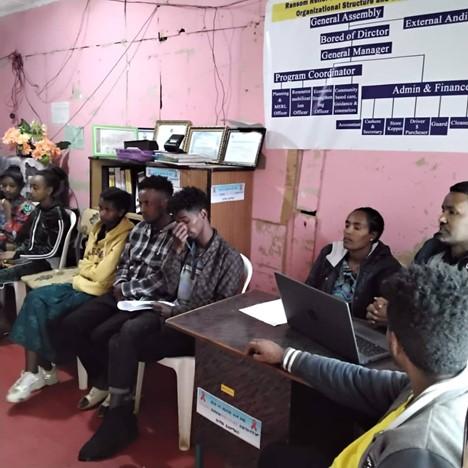
Story
29 April 2025
Promoting Health from Within: UN Wellness Week Kicks Off in Ethiopia
The UN community in Ethiopia is participating in a series of activities as part of UN Wellness Week, a global initiative led by the United Nations to promote the physical, mental, and emotional well-being of its staff.Organized by the UN Health Care Center, the week features a variety of events including a health expo, screenings for non-communicable diseases (NCDs), informative lectures on a range of health topics, and wellness activities such as mindfulness exercises and stress management sessions. At the opening of Wellness Week, UN Assistant Secretary-General and UN Resident and Humanitarian Coordinator in Ethiopia, Dr. Ramiz Alakbarov, emphasized the importance of staff well-being in achieving the UN’s mission.“Here at the UN, we have a duty—not only to advocate for global health—but also to lead by example by promoting health and wellness within our own community,” said Dr. Alakbarov.He noted that while UN staff work tirelessly to promote sustainable development and equity, non-communicable diseases pose a threat to these goals.According to the World Health Organization (WHO), non-communicable diseases (NCDs) disproportionately impact low- and middle-income countries, where 82% of premature NCD-related deaths occur. Diseases such as cardiovascular conditions, cancers, chronic respiratory illnesses, and diabetes caused at least 43 million deaths in 2021—representing 75% of all non-pandemic-related fatalities globally.Dr. Alakbarov urged staff to take simple, daily steps to reduce their risk of NCDs and to support one another in maintaining a healthy lifestyle.“We need to commit to prevention and encourage one another to take advantage of wellness programs and mental health resources in the UN,” he said. He also reaffirmed the UN Country Team’s dedication to fostering a supportive workplace that prioritizes the health and well-being of all staff.“A supportive workplace is essential to promote our health,” Dr. Alakbarov said.
1 of 5
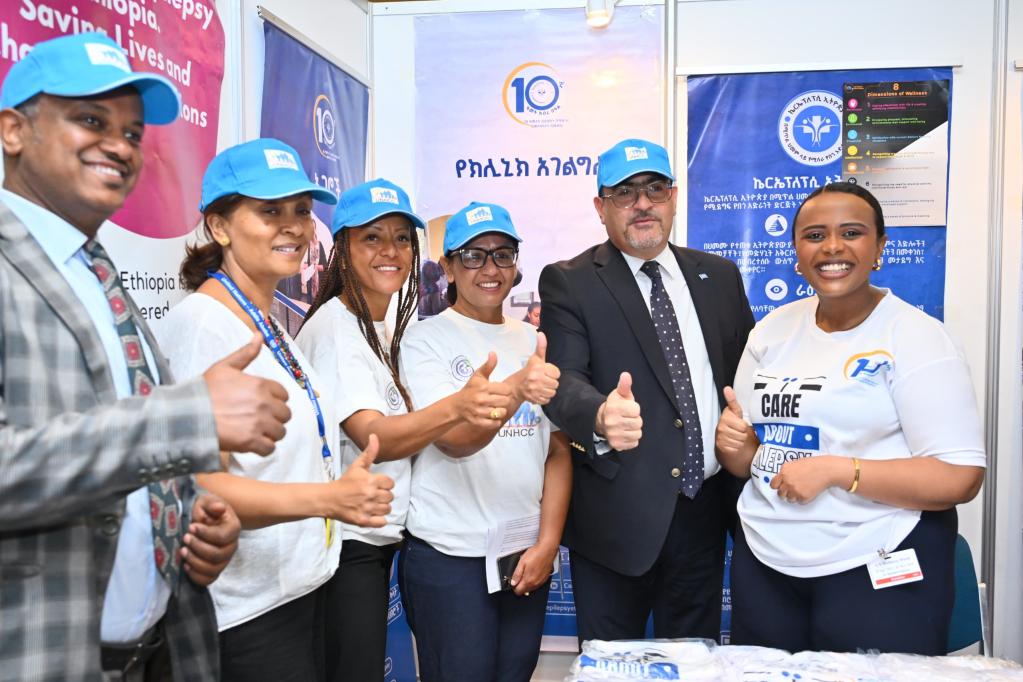
Press Release
20 June 2025
Ethiopia and United Nations Sign New Cooperation Framework
The Government of Ethiopia and the United Nations in Ethiopia have officially signed the United Nations Sustainable Development Cooperation Framework (UNSDCF) for the period 2025 to 2030, signaling a renewed partnership aimed at advancing Ethiopia’s development priorities and achieving the Sustainable Development Goals (SDGs).The signing ceremony took place at the Ministry of Finance and was attended by Her Excellency Semereta Sewasew, State Minister of Finance of Ethiopia, and Dr. Ramiz Alakbarov, UN Assistant Secretary-General and UN Resident and Humanitarian Coordinator for Ethiopia. The event was further attended by Heads of UN agencies operating in Ethiopia, emphasizing the strong collaborative effort to support the country’s development agenda.The new Cooperation Framework aims to address Ethiopia’s most urgent challenges through a comprehensive approach that promotes resilience, inclusivity, and sustainable growth by strengthening resilience to climate change and economic shocks, building sustainable food systems and improving livelihoods—particularly in rural areas—creating job opportunities with a focus on empowering youth and women, modernizing development programs through digital transformation, and providing targeted support to vulnerable populations such as women, children, and persons with disabilities.This framework is developed through an inclusive, participatory process aligned with Ethiopia’s Ten-Year Development Plan and the Home-Grown Economic Reform Agenda 2.0. It also reflects Ethiopia’s commitment to the global 2030 Agenda for Sustainable Development, emphasizing self-reliance, peace, and stability. The UNSDCF is organized around five strategic pillars—Peace and Good Governance; Economic Development, Food Security, and Energy; Social Services, Education, and Protection; Environmental Sustainability, Climate Resilience, and Disaster Preparedness; and Gender Equality and Youth Empowerment—that will guide interventions over the next five years, with the aim of complementing and strengthening Ethiopia’s ongoing efforts toward sustainable and inclusive development.An estimated US$6.5 billion is required to implement the framework fully over five years. Currently, approximately US$1.5 billion has been mobilized, leaving a funding gap of US$5 billion. Addressing this gap will be critical for realizing the framework’s objectives and ensuring impactful results.Ethiopia hosts one of the largest United Nations Country Teams (UNCT) globally, comprising about 28 UN agencies based in Addis Ababa. To enhance coordination and maximize impact, the framework introduces strengthened mechanisms, including empowered Results Groups responsible for integrated planning, monitoring, and reporting. These measures are designed to improve coherence and efficiency across UN interventions.“The new Cooperation Framework embodies our shared vision and trust in Ethiopia’s reform journey,” said Her Excellency Semereta Sewasew. “It sets a strong foundation for transformative progress, and I urge all UN agencies to fully implement the coordination mechanisms outlined, as this is essential for maximizing our collective impact.”Dr. Ramiz Alakbarov emphasized, “This Framework reflects the strength of our partnership with Ethiopia. Through joint efforts, we aim to build resilient systems, empower women and youth, and develop sustainable solutions so that no one is left behind. The UN is committed to leveraging its expertise and partnerships to support Ethiopia’s development priorities and accelerate progress toward the SDGs.”The UNSDCF is scheduled to commence in July 2025, with the Government of Ethiopia reaffirming its commitment to its effective implementation. The partnership aims to deliver measurable progress in Ethiopia’s journey toward a peaceful, prosperous, and resilient nation.
1 of 5
Press Release
10 April 2025
UNOPS Executive Director to visit Ethiopia, Somalia and Sudan
Jorge Moreira da Silva, UN Under-Secretary-General and UNOPS Executive Director, is scheduled to visit the Africa region, in a five-day visit that will take him to Ethiopia, Somalia and Sudan. During his visit, Mr. Moreira da Silva will meet national authorities and development partners. He will discuss the practical solutions that UNOPS offer to partners to maximize the impact of their humanitarian, development and peace operations ―all in support of the Sustainable Development Goals.The visit also aims at getting a better understanding of the needs on the ground, and how UNOPS can scale operations to respond.UNOPS ongoing support in the region includes: In Sudan, where half of the population ―some 25 million people― need humanitarian assistance and protection, UNOPS is strengthening health infrastructure, improving access to clean, safe water, supporting peacekeeping operations to protect civilians, and facilitating a more sustainable and equitable use of natural resources. In Somalia, UNOPS works to strengthen the capacity of Somali institutions and supports partners in a range of sectors, such as health, governance, peace and security. We work to support reconstruction and state-building through disaster preparedness planning, crisis recovery, climate-resilient infrastructure and strengthening of the security sector.In Ethiopia, UNOPS works with partners to support national and international development priorities. Over the years, with our partners, we have helped strengthen health and education systems and supported food security. This includes environmentally friendly solutions and innovative models to modernize Ethiopia’s agriculture sector, provide clean energy to off-grid areas and improve health services across the country.ENDSPress contact details:For media requests, please contact Taraneh Dadar <taranehd@unops.org> or Luis Piselli <luispi@unops.org>About UNOPSUNOPS offers practical solutions across peace and security, humanitarian and development operations. We help the United Nations, governments and other partners, such as the European Union and its Member States, to manage projects, and deliver sustainable infrastructure and procurement across the world. Read more: www.unops.org.
1 of 5
Press Release
09 April 2025
Restoring Hope: Health and Education Facilities Rebuilt in Asgede Woreda, Tigray
Tigray, Ethiopia, April 2025 – In a significant step towards rebuilding essential public services in conflict-affected areas, the Edaga Hibret Health Centre and May Hanse Primary School in Asgede Woreda, Tigray, have been successfully rehabilitated and officially handed over on April 8 and 9, 2025 respectively. These projects were part of the Response-Recovery-Resilience for Conflict-Affected Communities in Ethiopia (3R4CACE) Project, financed by the World Bank and implemented by UNOPS, demonstrating a commitment to restoring critical health and education services for the community.The conflict had left both the health centre and the school severely damaged, disrupting access to healthcare and education for thousands. Through these reconstruction efforts, the Government of Ethiopia and its partners have worked to rebuild resilient infrastructure that now serves the needs of the local population. Healthcare at Edaga Hibret Health Centre - The Edaga Hibret Health Centre, which had previously suffered extensive damage—including the destruction of the outpatient department (OPD), pharmacy, and chemical storage areas has been rehabilitated to once again provide essential healthcare services. The newly improved facility now includes:A new pharmacy block to enhance medical supply storage and distributionA hybrid toilet building with a septic tank and soak-away pit for better sanitationA water supply system to improve hygiene standardsAn electrical system to ensure uninterrupted operationsExternal works, such as fencing, gates, walkways, and water points, creating a secure and accessible environmentWith these improvements, the health centre is now able to serve 20,000 patients, ensuring better access to quality healthcare, particularly for disabled individuals and vulnerable populations.Education at May Hanse Primary School - Similarly, May Hanse Primary School has been reconstructed to provide a safe and conducive learning environment for students who had previously been left without a functioning school. The recovery efforts included:Two new classroom blocks with six classrooms, each accommodating at least 50 studentsA hybrid toilet building with modern sanitation facilitiesA water supply system to support hygiene and daily school operationsAn electrical system for improved learning conditionsExternal works, including fencing, gates, walkways, and landscaping to enhance accessibility and securityAs a result, the school now accommodates 1,978 students, many of whom had no access to education due to the conflict. The school has targeted to employ 46 teachers, ensuring that students receive quality instruction. Additionally, blackboards have been procured, and desks are set to be delivered to fully equip the classrooms.The successful rehabilitation of the Edaga Hibret Health Centre and May Hanse Primary School stands as a testament to the dedication of the Ethiopian government, the World Bank, and UNOPS to restoring essential services and fostering resilience in conflict-affected regions.
1 of 5
Press Release
06 March 2025
UNOPS supports healthcare delivery in Ethiopia with handover of vital equipment for distribution of supplies
UNOPS is pleased to announce the successful handover of a range of vital equipment to the Ethiopian Pharmaceutical Supply Service (EPSS). This procurement, conducted on behalf of EPSS, represents a significant step forward in its mission to strengthen the distribution of healthcare supplies to health facilities nationwide. The delivered items include 2 refrigerator trucks, 16 land cruiser vehicles, 10 euro cargo trucks with refrigerated cargo boxes, 10 mini-vans Euro cargo, 4 mini-vans Trakker with cargo boxes, 19 motorcycles, 18 generators, cold chain equipment, spare parts and accessories, a forklift, and a floor cleaning machine. The procured items are equipped with modern safety measures and eco-friendly technology, intended to enhance the operational capabilities of EPSS branches. This will allow EPSS to deliver services to health facilities with improved efficiency and reliability. During the handover ceremony, Ms. Worknesh Mekonnen, Director of the Horn of Africa Multi-Country Office of UNOPS, and Representative of the African Union, said: "We are thrilled to deliver these vehicles, generators, cold chain equipment, and other related materials. This handover represents our commitment to meeting the evolving needs of our partners, and we take great pride in providing the support that enhances their operations”The event was attended by H.E. Dr. Mekdes Daba, Minister of Health; Mr. Dr. Abdulkedir Gelgelo, Director General of Ethiopian Pharmaceutical Supply Service; Ms.Mazengya Lucy, Africa CDC East Africa Regional Director, and other government officials reflecting the strong partnerships and collaboration driving this initiative.UNOPS remains committed to supporting practical solutions for sustainable development and humanitarian efforts, delivering innovative solutions for community well-being, promoting sustainability, and upholding operational excellence.
1 of 5
Press Release
25 February 2025
Germany commits additional 50 million Euro for cross-country humanitarian responses
At a press conference held at the UN Conference Center today, H.E. Jens Hanefeld, Ambassador of the Federal Republic of Germany to the Federal Democratic Republic of Ethiopia and Permanent Observer to the African Union, together with UN Assistant Secretary-General and UN Resident and Humanitarian Coordinator for Ethiopia, Dr. Ramiz Alakbarov, reaffirmed their joint and continued commitment to the people of Ethiopia. The event highlighted Germany’s additional commitment of 50 million EUR in humanitarian assistance, which will support cross-country projects implemented by UNHCR, UNICEF, and UN Women. This funding, officially announced at the end of 2024, will strengthen the humanitarian response also in Ethiopia over the coming years and address critical needs in vulnerable communities.Dr. Alakbarov expressed gratitude for Germany’s unwavering support and its role as a steady and reliable partner to the UN system in Ethiopia. He emphasized Germany’s commitment to the principles of the Grand Bargain, which aim to improve the effectiveness and efficiency of humanitarian action. By providing unearmarked funding, Germany enables UN agencies to respond flexibly and swiftly to emerging humanitarian crises, ensuring that resources are allocated where they are most needed. "The United Nations deeply appreciates the steadfast support of the people and Government of Germany in addressing Ethiopia's humanitarian challenges. Germany’s flexible and vital contributions have enabled lifesaving assistance while fostering resilience among vulnerable communities. This partnership exemplifies the power of global solidarity and our shared commitment to dignity, inclusion, and sustainable solutions for those most in need," said Dr. Alakbarov.In 2024, Germany provided significant financial support to the UN system in Ethiopia, channeling a total of 44 million EUR through several UN agencies. UN OCHA received 14,9 million EUR, prioritizing anticipatory action in drought-affected areas and localization efforts through the Ethiopian Humanitarian Fund (EHF), where Germany remains the largest donor in 2024. UNHCR Ethiopia received 4,1 million EUR as part of a regional initiative to support displaced persons in the East and Horn of Africa and the Great Lakes region. UNICEF Ethiopia was allocated 3,8 million EUR to expand its child protection efforts, especially in response to sexual and gender-based violence. Additionally, UN Women is advancing gender accountability, addressing inequality and gender-based violence in humanitarian crises with German support.Beyond these initiatives, German funding has also extended to the World Food Programme (19,1 million EUR), IOM (1 million EUR) and WHO (750.000 EUR).Building on this strong foundation, Germany’s additional 50 million EUR commitment to cross-country projects will further enhance the humanitarian response. This funding will ensure that lifesaving assistance reaches those most in need while fostering resilience and sustainable development. Together, Germany and the UN system in Ethiopia are working to address urgent humanitarian needs while promoting long-term solutions that protect and empower the most vulnerable communities.For any inquiries you may have, please contact: Ms. Sophia Stephan: Press and Culture Section Head, Embassy of the Federal Republic of Germany: Pr-1@addi.diplo.de Mr. Fanuel Lakew, Press Assistant: Pr-11@addi.diplo.de Mr. Getachew Dibaba, UN Ethiopia, Email: Getachew.Dibaba@un.org Phone: +251-911-125-201Find us: German Embassy Addis Ababa on X / German Embassy Addis Ababa on Facebook UN Ethiopia Website / UN Ethiopia on X / UN in Ethiopia on Facebook
1 of 5
Latest Resources
1 / 11
Resources
29 April 2025
Resources
29 April 2025
1 / 11


















